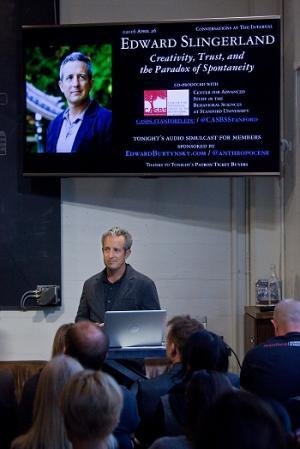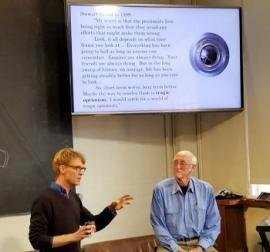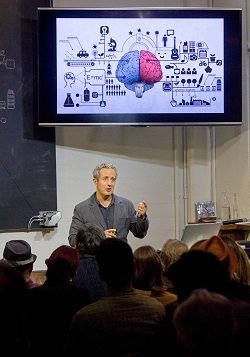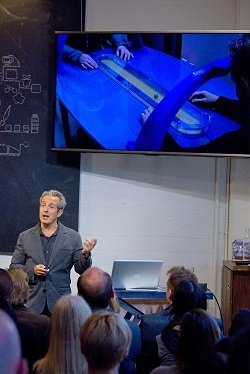
Continuing the Center’s collaboration with The Long Now Foundation, 2015-16 CASBS fellows Edward Slingerland and Andrew Chignell delivered separate talks at the Long Now’s salon series held at The Interval in San Francisco.
The Interval is a bar, café, museum, and social hub intended “to help make long-term thinking more instinctive, rather than difficult and rare.”
Consistent with that broad theme, on April 26 Slingerland delivered a fascinating talk about body and mind, science, and instinct, and how historical knowledge benefits our present and future. A Q&A session followed, moderated by The Interval’s salon series producer, Michael McElligott.

Slingerland is a noted authority on early Chinese thought, religious studies (comparative religion, cognitive science of religion), cognitive linguistics (blending and conceptual metaphor theory), ethics (virtue ethics, moral psychology), and the relationship between the humanities and the natural sciences. His talk – “Creativity, Trust and the Paradox of Spontaneity” – focused on wu-wei, an early Chinese concept that anticipated aspects of modern neuroscience more than two millennia ago. Assisted by an eye-popping slide presentation, he entertainingly discussed wu-wei’s contemporary relevance to creativity, trust, virtue, and the future of human cooperation.

Slingerland enjoyed the experience as much as the standing room-only audience at The Interval appeared to.
“It’s a fantastic venue, intimate but large enough to hold a good crowd,” he said. “People are relaxed (the bar helps!) and more willing to ask questions than in a more formal environment, which led to a great Q&A and discussions after.”
The talk circled back to themes Slingerland explored in his 1998 PhD dissertation, earned at Stanford in religious studies, and extends to his 2014 book Trying Not to Try: Ancient China, Modern Science, and the Power of Spontaneity (2014). Currently he is professor of Asian studies and Canada Research Chair in Chinese Thought and Embodied Cognition at the University of British Columbia, where he also holds adjunct appointments in philosophy and psychology.
During his year at CASBS, Slingerland has been working on a book-length project on conceptions of mind and body in early (5th – 3rd century BCE) China. He also launched another project on the role of intoxicants and ecstatic experience in the rise of human civilization. Finally, he has continued to direct a large, interdisciplinary project on the evolution of religion and morality.
The talk tied into Chignell's CASBS year research, where he made inroads in developing a more systematic and empirically informed account of hope and its conditions. Hit book-length treatment, forthcoming in 2017, is What May I Hope? Answers to a Kantian Question (Routledge).On June 28, Chignell discussed the idea of hope through the centuries, as well as its future in the epoch ahead. It included a glimpse at the theoretical, empirical, and practical dimensions of hope and how it differs from the separate concept of optimism. A discussion followed with the legendary Stewart Brand, a Long Now co-founder.

The Interval provided Chignell an excellent opportunity to share his work-in-progress with a public audience – and Brand.
“It was great to have a chance not only to speak at The Interval, but also to have a public discussion afterwards with Stewart Brand, creator of the Whole Earth Catalog and co-founder of the Long Now Foundation," said Chignell. "Between the excellent cocktails, the good conversation, and the enthusiastic crowd, it was one of the best evenings I’ve had in a long time.”
Currently Chignell is associate professor of philosophy at Cornell University. His recent work includes looking at hope in both philosophical and popular contexts, both through the ages up to the present. This includes both historical accounts of hope, as well as hope’s relationship to expectation, acceptance, and faith. He is also co-director of the Hope and Optimism project.
CASBS is pleased to feature its fellows and affiliates at The Interval’s salon talks. Previously during the 2015-16 academic year fellow Louis Hyman gave a talk there; research affiliates Frances Morphy and Howard Morphy delivered a joint talk.Learn more about the CASBS-Long Now partnership and previous salon talks in a newsletter article here.
Photos by Gary Wilson (Courtesy of the Long Now Foundation)

